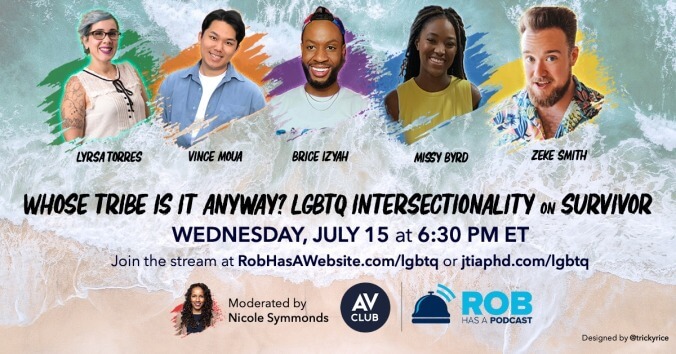Lyrsa Torres, Vince Moua, Brice Izyah, Missy Byrd, Zeke Smith Graphic: TrickyRice
J’Tia Taylor knows what most Survivor fans must think of her. She’s “the one who dumped the rice in the fire” on 2014’s Survivor: Cagayan. “I am super domineering,” the Chicago-based nuclear engineer tells The A.V. Club. “And it works well for me at work, where I am given actual authority to do things. It does not work so well on the island, when I just feel like, you know, ‘Maybe I should just take the reins.’” But her strong personality aside, Taylor feels that race played a large factor in her Survivor journey and how she was edited—and she’s been at the forefront of a new movement of Black Survivor alums calling for the CBS reality series to hire more Black people in all areas of production, in hopes that it will put an end to harmful stereotypes being played up for entertainment. “We’ve been talking for a long time about how we do not get the best portrayal on Survivor,” says Taylor, a mother of two who was motivated to create change after seeing the need for reforms of all kind in the wake of the deaths of George Floyd and Breonna Taylor. “We all love the game, but we don’t always like how they treat us.”
A large part of this new movement is an online petition Taylor has been championing on moveon.org that lists demands of Survivor executive producers Jeff Probst, Matt Van Wagenen, and Mark Burnett; ViacomCBS; and the production companies behind the series. Among the demands: casting “BIPOC for at least 30% of contestants each season hereafter,” a commitment to “equitably compensate and hire more BIPOC in all parts of production,” and a public pledge to “ensure those who have promoted prejudices (e.g., ableism, racism, sexism, white supremacy, religious intolerance, homophobia, transphobia) are not cast.” (After contestant Dan Spilo inappropriately touched women on set in 2019 during the filming of season 39, CBS and the Survivor production team instituted mandatory anti-harassment and reporting policies and trainings for all crew and cast, which include unconscious bias and sensitivity training.)
Taylor says the petition was just the movement’s first “P” in a “Three P Plan,” the latter Ps being press and panel. In the days since launching the petition, Taylor and a handful of her fellow Black Survivor alums have been doing as many interviews as possible. And Taylor joined Edge Of Extinction’s Julia Carter for a conversation with fellow Survivor all-star and Rob Has A Podcast host Rob Cesternino in late June as part of his new Black Voices Of Survivor series. Cesternino also hosted a large panel discussion organized by Survivor: Marquesas’ Sean Rector, which gathered 12 Black Survivor alums, including the first two of Survivor’s four Black winners, Vecepia Towery (Marquesas, season 4) and Earl Cole (Fiji, season 14). And a few days later, the Soul Survivor Organization, “a group formed by former African American participants of the American reality television series Survivor,” hosted “Tribes And Tribulations,” a live discussion of their experiences being Black on a competitive reality television series.
As part of organizing “Tribes And Tribulations,” Taylor began an ongoing dialogue with her season 28 castmate Brice Izyah, the first openly gay Black man to compete on Survivor. “I was speaking with Bryce, and he was like, ‘You know, it’s even harder for me as a Black gay man,” says Taylor. “I was like, ‘Yeah, that’s true.’ So even when we were putting together “Tribes And Tribulations,” we knew we also needed to talk about this intersectionality. Even me, as a Black woman: There’s special issues that come with being black, and special hurdles that come with being a woman. So we said, ‘We should talk about this, because that’s something that really hasn’t been talked about.’”
Taylor hopes to soon put together a panel focusing the female Survivor experience, but is currently focused on the panel of LGBTQ alums she has organized for Wednesday evening. “Whose Tribe is it Anyway?: LGBTQ Intersectionality On Survivor” will feature Izyah, Zeke Smith (Survivor: Millennials vs. Gen X, season 33 and Survivor: Game Changers, season 34), Lyrsa Torres (Survivor: David vs. Goliath, season 37), Missy Byrd, and Vince Moua (Survivor: Island of the Idols, season 39). The panel will be moderated by Nicole Symmonds and hosted on Rob Has A Podcast’s website in partnership with The A.V. Club, which will stream the panel on our website and social media accounts.
“Survivor has struggled with being able to portray what it’s like to play this cutthroat social game from the perspective of its LGBTQ contestants. I’m really excited to hear them describe their shared experiences in this forum,” Cesternino tells The A.V. Club. His sentiments echoed by Taylor: “This is just another step in trying to get everybody a fair shake, and understand that there are special issues that come with being a part of different groups.” “Whose Tribe is it Anyway?: LGBTQ Intersectionality On Survivor” begins at 6:30 p.m. ET on Wednesday, July 15. The A.V. Club will have the livestream embedded in a post on our homepage.
Looking for ways to advocate for Black lives? Check out this list of resources by our sister site Lifehacker for ways to get involved. If you want to support LGBTQ youth, consider donating to GLSEN, which promotes anti-bullying initiatives and gay-straight alliances in schools nationwide, and The Trevor Project, which operates a confidential hotline staffed by trained counselors who provide crisis-intervention and suicide-prevention services.








































